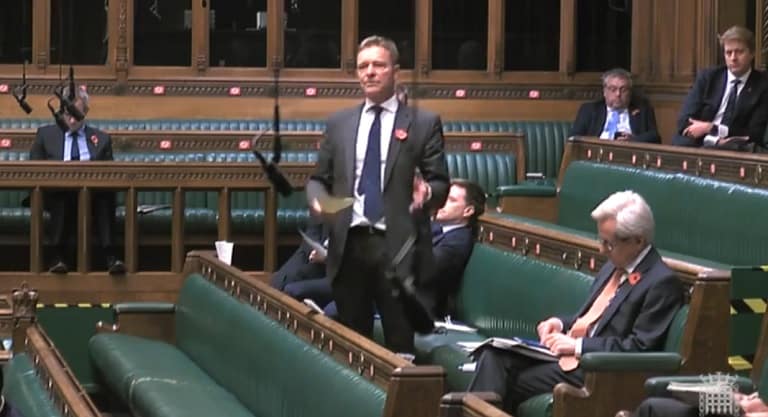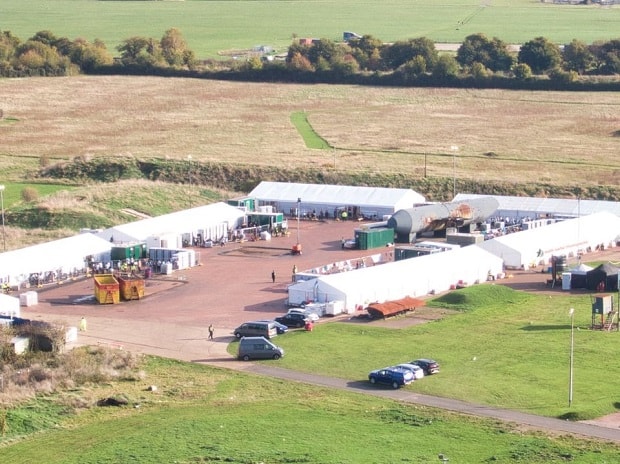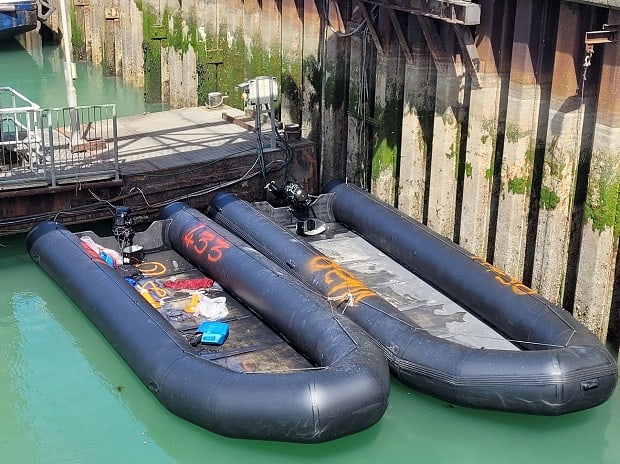
A company contracted to find and operate accommodation for people awaiting asylum claims – which included the most recent procurement of student rooms at the former Broadstairs uni campus – has seen its profits after tax for year ending January 31,2022, grow by five times the amount made in 2021.
Clearsprings Ready Homes, also the provider of social services care leaver accommodation under a contract with Kent County Council which runs until next year, made a whopping £28,012,427 compared to £ 4,419,841 the previous year, according to accounts lodged with Companies House.
Clearsprings, which also runs the Napier Barracks site, had an overall turnover of £501,822,664 for the year.
The student campus site had around 70 people moved in last weekend but MP Craig Mackinlay says he has been alerted that they have now been moved back out.
In a tweet the MP said: “Important update #Broadstairs. I am given to understand that @kentfirerescue refused to certify the old Christ Church Uni block as safe for migrant accommodation. All 77 who arrived over the weekend have been moved by coach out of the area. This location was never appropriate.”
(Update) However, Mark Woodward, Kent Fire and Rescue Service’s (KFRS) Assistant Director for Customer and Building Safety, said: “Our building fire safety team has made contact with the site operator for the building but no visits have yet been carried out and no recommendations have been issued.”
The move out of the building has also been confirmed by St George’s headteacher Adam Mirams in a message to parents and carers of pupils.
‘Demand remains high’
In a statement in its annual accounts on behalf of directors James Vyvyan-Robinson, Randle Slatter and Steven Lakey, it says: “The company operates ten-year contracts with the Home Office for the provision of asylum accommodation, support and transport services in the South of England and Wales. The Home Office contracts run until September 2029.
“Demand for accommodation for asylum seekers has remained high throughout the year. This has been driven by an ever-increasing influx of asylum applicants to the UK due to high levels of political and economic turmoil in many countries. Contingency accommodation including hotels has increased over the year.
“Operating profit on sales was 6. 7%, compared with 2.9% the previous year. Return on capital employed was 96%, compared with 25% in the previous year. Current ratio remained unchanged at 1.0, reflecting a continuation of conservative fi11ancial management policies.
“Turnover per employee in the year was £2,472,033 (2021 – £989,839). The increase reflects growth in the number of asylum seekers accommodated under the Home Office contracts.
“Operating profit per employee in the year was £166,573 (2021 – £28,854). Revenue growth while maintaining cost control is mainly responsible for this improvement.
“The strategic agenda for CRH will be influenced by the UK government’s “New Plan for Immigration” and its associated legislation. CRH is well-placed to bid for new accommodation contracts when tenders are invited by the Home Office.
“Demand for asylum accommodation is driven by the arrival of asylum applicants in the UK, and the number of arrivals per year is expected to continue at a high level for the foreseeable future.”
The accounts say Clearsprings Ready Homes has 203 employees, with salaries totalling £5.84million. Directors’ renumeration, including pension contributions, was £232,583 with the highest paid director receiving remuneration of £211,032 (2021 – £192,943).
The ultimate controlling party is Graham King due to his shareholding in Clearsprings (Management) Limited, which is the Ready Homes parent company.
Just over £6.5million was payable for tax.
The 10 year contracts totalling £4billion
In 2019 seven regional contracts were agreed for a 10 year period to provide accommodation and transport (the accommodation contracts), plus a national contract for a new helpline and support service (AIRE – Advice, Issue Reporting and Eligibility).
The government awarded the accommodation contracts to three providers – Clearsprings Ready Homes, Mears Group and Serco – who each took on two or three UK regions. Migrant Help won the AIRE contract. Clearsprings was the only group to bid for the contract for the south of England.
The new contracts became fully operational from September 2019 and had a total estimated value of £4 billion over 10 years, from 2019 to 2029.
Clearsprings has two Home Office contracts. The value of these is £662 million for operations in the South and £334 million for Wales totalling £996 million for the 10 year period.
The Clearsprings Ready Homes website says: “As a provider of accommodation services to the Home Office since 2000, our contracts cover London, the South of England and Wales. We don’t just provide accommodation, we also deliver transportation services, repairs and maintenance and safeguarding support for residents. We also work closely with non-government organisations, local voluntary groups, statutory services, local authorities and landlords to ensure the properties are fully compliant and the welfare of the residents is closely managed.”
Broadstairs campus issue raised in Parliament

The issue of using the CCU campus site in Broadstairs for asylum dispersal accommodation without any prior notification to MPs or Thanet council was raised in Parliament yesterday (November 7) by South Thanet MP Craig Mackinlay. He also said Thanet council had told the Home Office back in August that the site was not appropriate for that use.
He also questioned whether: “Clearsprings and Serco are simply running roughshod over planning consents, local authorities and local consultation” adding that the Home Office should be involved when large sites are selected.
The site is now empty again, according to the MP’s latest tweet.
The year end accounts report for Clearsprings says: “Local authorities are always consulted extensively on the location and operation of accommodation, to ensure and promote harmonious integration of the Company’s service users with the wider community. “The Directors aspire to minimise the adverse environmental impact of the Company’s activities. Service users are encouraged to take a responsible approach to the use of energy. The Company’s employees are also encouraged to use greener forms of transport where possible.
“The directors are concerned to maintain a reputation for high standards of conduct and governance in the Company’s activities.”
However, Thanet council leader Ash Asbee this weekend spoke exclusively to The Isle of Thanet News about her “absolute dismay” that there had been no notification or consultation prior to the campus site being commissioned by Clearsprings.
Manston now holding 1,800 people

North Thanet MP Sir Roger Gale also spoke about Manston and the need for it to be a processing centre rather than any other form of accommodation. He called for the extra facilities at the site to now be brought down.
Immigration Minister Robert Jenrick, who confirmed there are now around 1,800 people at the Manston centre, said it may be ‘prudent’ to keep the infrastructure in place over the coming months as November saw the highest number of small boat crossings last year and may well do so again this year.
He also said the aim was to move away from hotel use, costing “billions per year,” to “decent but not luxurious” accommodation.
Last week the Home Office said there are currently more than 37,000 asylum seekers in hotels at a cost of £5.6 million a day. The cost of bridging hotels for Afghan people seeking asylum is £1.2million a day.
People seeking asylum in the UK

This year there has been just under 40,000 people seeking asylum detected on small boat Channel crossings to the UK. Among those, some are fleeing war-torn countries like Afghanistan. Others face persecution in their home country.
This year there has been a large rise in people from Albania making the Channel crossing to the UK.
Last month the Home Affairs Committee. heard two years ago the figure was 200, last year 800 and this year so far 12,000 Albanian people have made the crossing of which 10,000 have been single, adult males.
Dan O’Mahoney, Clandestine Channel Threat Commander told the committee: “Albanian criminal gangs have gained a foothold in the north of France and have begun facilitating very large numbers of migrants.”
A poll asking people in Albania why they wanted to leave the country found corruption, low salaries, poor working conditions and a low quality of life given as their main reasons. Albanian people also make up the highest number of potential victims of modern slavery referred into the UK’s National Referral Mechanism
It is not illegal to enter the UK to seek asylum although it is illegal to be the trafficker of those people. Under international law, anyone has the right to apply for asylum in any country.
The UN Refugee Convention recognises people fleeing persecution may have to use irregular means to escape and claim asylum in another country.
Those who are trying to seek asylum in the UK often have ties to the country such as family members who live here or they speak the language.
The Refugee Council and other charities have called for the UK to provide safe and legal routes for those seeking asylum to travel to the UK.

Thanet councillor Aram Rawf, previously an asylum seeker before gaining British citizenship, spoke at a demonstration outside Manston last weeknd. He said: “No one should be taken in by what’s happening here. The government is simply using asylum-seekers as scapegoats for the effects of years of cuts and austerity. What the government needs to do is provide a safe route for asylum seekers to come to this country.”
One man’s journey from torture and war to caring for the Thanet community
Asylum application backlog
The issue has been exacerbated by a backlog in dealing with asylum applications. In 2021 there were 48,540 asylum applications, a 63% increase compared with the previous year (29,815). The number of applications is higher than at the peak of the European Migration crisis (36,546 in year ending June 2016), and the highest number of asylum applications in the UK since the year ending December 2003 (49,407).
Last month the Home Affairs Committee heard that 96% of the asylum claims from 2021 have not been completed and individuals are still awaiting decisions. Only 4% of those who arrived by boat in 2021 have had a decision on their claim. The Home Office “work in progress” caseload stands at 166,085, which is nearly double the figure in June 2020 and a significant increase since June 2021.
A Home Office spokesperson previously said: “The number of people arriving in the UK who seek asylum and require accommodation has reached record levels, placing unprecedented pressures on the asylum system.
“The Government is working with all local authorities in England, Wales and Scotland to provide more suitable accommodation for asylum seekers and to end the unacceptable use of hotels, with more than £21 million in grant funding already been provided to local authorities to help them respond to challenges in their area.”
‘Full dispersal’ funding
The Home Office says all local authority areas in England, Scotland and Wales became an asylum dispersal area by default on 13 April 2022. Officials say the shift to ‘Full Dispersal’ will increase the number of suitable properties that can be procured for ‘destitute asylum seekers.’
The changes to asylum dispersal have been backed by extra government funding. More than £21million in un-ringfenced grant funding has been committed to make sure eligible LAs can provide wraparound support locally.
Officials say local authorities will also receive £3,500 for each new bed dispersal accommodation in the 22/23 financial year (1 April 2022 and 31 March 2023).

